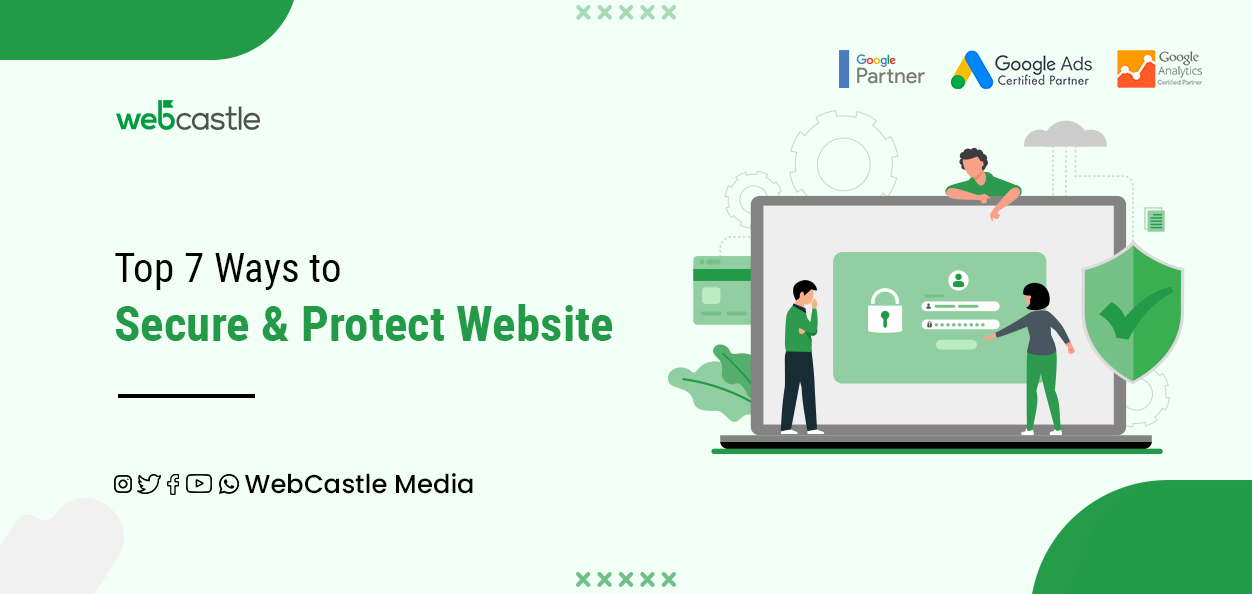Web design, especially eCommerce sites are getting hacked and every time this number has likely become even greater.
So, what are the measures to be taken to protect your eCommerce site’s sensitive customer data from being stolen?
To secure a website with 100% certainty, the best security begins with website builders and content management systems (CMS) but still there remains there’s always going to be an element of risk.
The responsibility for keeping a website secure needs to practice simple, valuable strategies no matter which approaches you take in the battle against hackers and bots.
It’s impossible to deny the social reasons to occur online which have been an extremely accelerated global shift towards remote work. Alternative workplaces and the increase in online traffic have pushed businesses into a digital age and to be even more reliant on the internet.
The thought of seeing all of your work altered by data breaches and hacks would happen all the time not only to the big but also to the small ones.
Choose a secure eCommerce platform
An eCommerce solution most of the time might entail a lot of costs and security risks making the site work faster, easier and less risky in terms of security. Adopting and customizing eCommerce solutions will save your team time, money, and human resources together with good built-in security practices.
Deploy HTTPS with SSL certificates
Towards building a new website, your plan to get huge traffic from Google, the advisable option is to hire an SSL certificate for a decent ranking. It is not all of a bit much, they are a good reason to cross over the sensitive information which does not go as plain text like before but in a readable form. An SSL certificate wraps all that sensitive information in a layer of encryption starting point for having a secure website with all sensitive information stored in non-readable format. All the major website builders enable HTTPS by default for every website which would bring the SSL certificate easily. Most web hosts are sure and simple, providing available right in the control panel being a simple tool for some reason and generating a free domain validation certificate and head to cPanel or your host’s custom dashboard to install it.
Reduce Employee’s Digital Footprints
Many employees tend to work online, particularly by signing up for new services and their digital footprint is the data trail created online to build on providing information to different services. Any small actions online can reduce security breaches and employees are advised to permanently delete all the old unused accounts.
Install Security Plugins
A content management system-based website can be well enhanced with security plugins which can actively prevent website hacking attempts. The known security plugin options associated with CMS include iThemes Security, Bulletproof Security, Sucuri, Wordfence and fail2Ban for WordPress. Then for Magneto, they are Amasty and Watchdog Pro.
For Joomla, they are Jacker Watch, joy defender, firewall and Antivirus Website Protection. The addressing of the security vulnerabilities in each platform and even the attempts could threaten your website. No matter whether the site is a CMS-managed site or HTML page they go above and beyond simply closing site security loopholes from malware detection to vulnerability identification and the plugins are definitely an investment worth considering.
Secure your login page
When it comes to login security the two simple implementations of strong passwords and multi-factor authentication offer the two layers of security. Strong passwords can be made fantastic with a password manager and finding one would go better for two reasons: easy password creation and stopping automatic login business.
Take care of your passwords, create enforceable strong password policies and set up multi-factor authentication logins which are easy to set up on most website builders. There are different plugins to offer security and it differs with the platform you use. Building the same from scratch also has the supported platform plugin to integrate Google Authenticator with your website.
Backup your site regularly
Thinking of securing a website is simple to execute as our normal backup schedule. Hackers are never scared of backup, but it is our precautionary measure to recover from a crisis, simply a safe place like a locker. Each opts for different approaches like automatic weekly backups, rewinding yourself in any backup, creating a duplicate site to export the XML file and taking advantage of any number of plugins. Some backup directly clouds and can even help you restore your site in a crisis.
Review App Permissions
When your employees log into work accounts they are opening a pathway to gain access to their data by downloading antivirus protection, realising viruses and fraudulent behaviour through seemingly innocent applications. To download apps without reviewing the requested permissions which are used to gather information and even if you accidentally grant the wrong permissions then it would go wrong.
These risks allow as much access to their phone and data and go mindful in web development of the risks associated with working from their phones.

